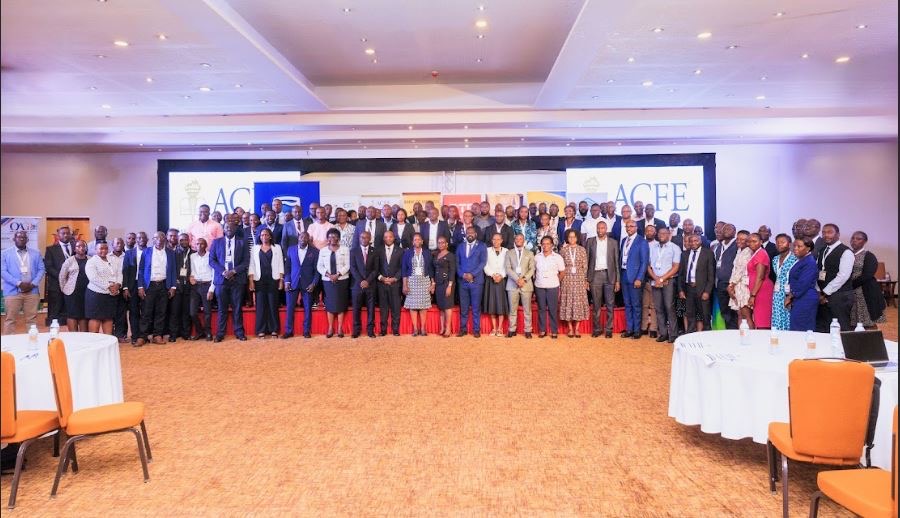The Association for Certified Fraud Examiners (ACFE) Uganda Chapter has convened its third annual conference under the theme, “Self-Guarding Integrity in the Virtual World: Responding to Deep Fakes and Insider-Induced Fraud.”
The gathering brought together fraud examiners, regulators, and public sector professionals to discuss emerging threats and strategies to safeguard both institutions and individuals in the digital era.
Mr George Mugabi Turyamureeba, CFE, President of ACFE Uganda, warned that fraud is evolving rapidly due to technological advances.
“Fraud evolves every day because of changes in technology,” he said, emphasising that proactive awareness and prevention are far more effective than reactive investigations, which often disrupt operations and slow service delivery.
“Fighting fraud is much easier when people understand how it occurs, how it manifests, and how it can be prevented,” Mr Turyamureeba explained.
He expressed concern over the high number of fraud cases dismissed due to poor investigative practices and mishandled evidence, noting that many cases fail “because of how they are investigated and how the evidence is preserved.”
He highlighted the Certified Fraud Examiners (CFE) program as a key initiative to equip professionals with the necessary skills to conduct thorough investigations and uphold evidentiary standards.
Beyond investigations, Mr Turyamureeba stressed the importance of public sensitisation and partnerships. While corruption often dominates discussions, he clarified that it is only one part of a broader fraud landscape.
Through conferences like this, organisations and the public are better informed about fraud risks, detection, and prevention strategies.
He urged fraud examiners to engage in outreach programs, strengthen collective action, and advocate for laws and security measures to protect anti-fraud professionals.
The digital era, however, presents new challenges. Cybersecurity consultant Arinaitwe Benard highlighted how fraud and cybercrime are adapting to the age of artificial intelligence.
He warned of emerging threats such as synthetic identity fraud, where real and fictitious information is combined to create false identities, and deepfake technology, which can manipulate faces, voices, and videos to produce false evidence or spread misinformation.
“Authentication may verify a name, but not whether the face belongs to the person,” Benard explained, citing examples of scams that have exploited digital trust, including a case in China where a scammer used video face-swapping to convince a victim to transfer $662,000. Fraudsters are increasingly using platforms like LinkedIn, Zoom, and gaming apps to impersonate executives or manipulate children, emphasising that even young users can be vulnerable.
Benard also highlighted insider threats, often driven by greed, revenge, or negligence, which can result in significant financial losses. He recommended staff training, simple verification techniques, and user behaviour analytics to detect anomalies and suspicious activity.
“Traditional perimeter security is ineffective when insiders have legitimate access. Continuous monitoring and analytics help close that gap,” he said.
Creating a proactive security culture, Benard noted, is equally important. Policies should guide AI use, and cybersecurity should be seen as an enabler rather than an obstacle.
“Why do cars have brakes? So that they can move faster. Similarly, we are the brakes of business. Our role is not to slow down the company but to enable it to operate safely and efficiently.” He urged individuals to remain vigilant, sceptical of urgency, and attentive to subtle cues in digital content that may indicate manipulation.
Meanwhile, cybercrime and money laundering remain growing threats in Uganda. Emmanuel Chagara, CEO of Milima Security, observed that digital finance has become a major channel for laundering illicit funds.
“Online scams, phishing, identity theft, and virtual asset fraud are no longer isolated incidents; they are major sources of criminal proceeds,” he said.
Mobile money, widely accessible in Uganda, has emerged as both a tool for financial inclusion and a vulnerability. A World Bank study found that 53% of mobile money agents in the country experienced fraud attempts, the highest in the region. Fraudsters exploit SIM swaps, phishing, and crypto payments to move money rapidly, making detection increasingly difficult.
Chagara emphasised that countering these threats requires technology, training, and regulation. Real-time transaction monitoring, behavioural analytics, and robust Know-Your-Customer (KYC) processes can detect suspicious activities.
Strengthening Uganda’s legal and regulatory framework, which currently contains gaps such as low penalties under the Computer Misuse Act, is essential.
“Cyberfraud and money laundering thrive in complexity. When processes are unclear or monitoring is weak, criminals take advantage,” Chagara said.
He called for a people-centred, intelligence-driven, and cooperative approach, urging investment in digital identity verification, cross-platform monitoring, and cyber-risk governance.
As Uganda and the world embrace digitalisation, experts agree that vigilance, continuous learning, and collective responsibility are essential to safeguarding institutions, individuals, and the integrity of the financial system.
By combining awareness, technology, and a culture of responsibility, both organisations and individuals can navigate the evolving digital landscape safely while continuing to thrive in an increasingly connected world.


